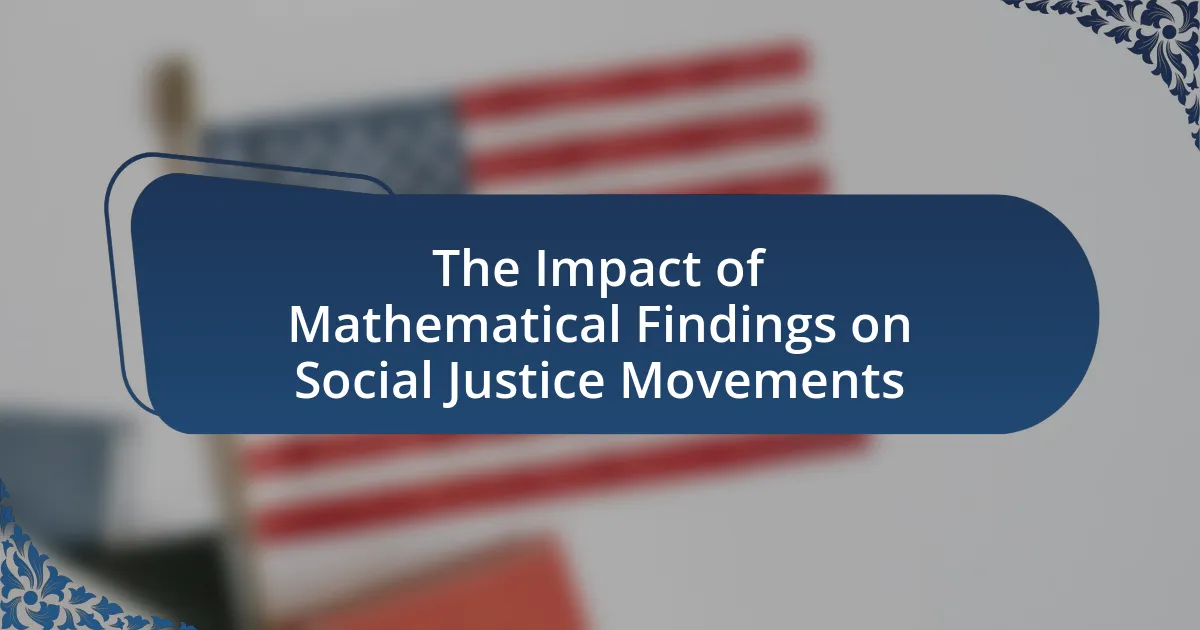The article focuses on the critical role of ethical considerations in mathematical research, emphasizing principles such as integrity, transparency, and responsible data use. It outlines the importance of ethical guidelines in preventing misconduct, ensuring the credibility of research findings, and promoting social responsibility. Key topics include the influence of ethical considerations on research outcomes, the implications of data privacy, and the consequences of ethical violations. Additionally, the article discusses frameworks for addressing ethical issues, the role of Institutional Review Boards, and future trends in ethical standards shaped by technology and artificial intelligence.

What are Ethical Considerations in Mathematical Research?
Ethical considerations in mathematical research include integrity, transparency, and the responsible use of data. Researchers must ensure that their work is conducted honestly, avoiding fabrication or falsification of results. Transparency involves clearly communicating methodologies and findings, allowing for reproducibility and peer review. Additionally, the responsible use of data entails protecting the privacy of individuals and ensuring that data is used ethically, particularly in sensitive areas such as healthcare or social sciences. These principles are essential to maintain public trust and uphold the credibility of the mathematical community.
Why are Ethical Considerations Important in Mathematical Research?
Ethical considerations are important in mathematical research because they ensure the integrity, transparency, and social responsibility of the research process. Ethical guidelines help prevent misconduct, such as data manipulation or plagiarism, which can undermine the validity of research findings. For instance, the American Mathematical Society emphasizes the importance of ethical behavior in maintaining trust within the scientific community and ensuring that research benefits society. By adhering to ethical standards, researchers contribute to the credibility of their work and promote the responsible application of mathematical theories and methods in real-world scenarios.
How do Ethical Considerations Influence Research Outcomes?
Ethical considerations significantly influence research outcomes by ensuring integrity, credibility, and social responsibility in the research process. When researchers adhere to ethical guidelines, they minimize the risk of misconduct, such as data fabrication or plagiarism, which can lead to invalid results and loss of public trust. For instance, studies have shown that ethical oversight, such as Institutional Review Board (IRB) approval, enhances the quality of research by promoting transparency and accountability, ultimately leading to more reliable and impactful findings. Furthermore, ethical considerations guide researchers in addressing potential biases and ensuring that their work benefits society, as seen in the ethical frameworks established by organizations like the American Psychological Association, which emphasize the importance of ethical practices in producing valid and socially responsible research outcomes.
What Role do Ethical Guidelines Play in Mathematical Research?
Ethical guidelines play a crucial role in mathematical research by ensuring integrity, accountability, and the responsible use of mathematical methods and findings. These guidelines help researchers avoid misconduct, such as plagiarism or data fabrication, which can undermine the credibility of the research community. For instance, adherence to ethical standards fosters transparency in methodologies and results, allowing for reproducibility and trust in mathematical conclusions. Furthermore, ethical guidelines promote the consideration of the societal impacts of mathematical applications, ensuring that research benefits society and does not cause harm. This is evidenced by the establishment of ethical review boards in many academic institutions, which evaluate research proposals for ethical compliance before approval.
What Types of Ethical Issues Arise in Mathematical Research?
Ethical issues in mathematical research primarily include data integrity, misuse of mathematical models, and the implications of research applications. Data integrity concerns arise when researchers manipulate or fabricate data to achieve desired outcomes, undermining the credibility of their findings. Misuse of mathematical models occurs when researchers apply models inappropriately, leading to misleading conclusions, particularly in fields like economics or epidemiology. Additionally, the implications of research applications can raise ethical dilemmas, especially when mathematical findings are used in ways that may harm individuals or society, such as in algorithmic decision-making processes that perpetuate bias. These issues highlight the necessity for ethical standards and accountability in mathematical research to ensure responsible conduct and societal benefit.
How do Issues of Data Privacy Affect Mathematical Research?
Issues of data privacy significantly impact mathematical research by limiting access to sensitive datasets necessary for analysis and model development. Researchers must navigate legal and ethical frameworks, such as GDPR, which impose strict guidelines on data usage, thereby restricting the types of data that can be utilized in mathematical modeling. For instance, the inability to access personal health data can hinder advancements in epidemiological models, as seen in studies where researchers were unable to use comprehensive patient data to improve predictive algorithms. Consequently, these privacy concerns can lead to less robust findings and slower progress in fields reliant on large datasets, ultimately affecting the quality and applicability of mathematical research outcomes.
What are the Implications of Misuse of Mathematical Models?
The implications of misuse of mathematical models include inaccurate predictions, misguided policy decisions, and potential harm to public trust in scientific research. When mathematical models are misapplied, they can lead to flawed conclusions, as evidenced by the 2008 financial crisis, where erroneous risk models contributed to widespread economic failure. Additionally, misuse can result in ineffective or harmful public health policies, such as during the COVID-19 pandemic, where misinterpretation of models influenced government responses. These consequences highlight the necessity for ethical considerations in mathematical research to ensure models are used responsibly and transparently.

How are Ethical Considerations Implemented in Mathematical Research?
Ethical considerations in mathematical research are implemented through adherence to established guidelines, transparency in methodology, and the responsible use of data. Researchers follow ethical standards set by organizations such as the American Mathematical Society, which emphasizes integrity, respect for individuals, and the societal impact of mathematical work. For instance, when conducting research involving human subjects, mathematicians must obtain informed consent and ensure confidentiality, aligning with ethical norms in broader scientific research. Additionally, the promotion of open access to research findings fosters transparency and accountability, allowing for peer review and public scrutiny, which are essential for maintaining ethical integrity in the field.
What Frameworks Exist for Addressing Ethical Issues in Research?
Several frameworks exist for addressing ethical issues in research, including the Belmont Report, the Declaration of Helsinki, and the American Psychological Association (APA) Ethical Principles. The Belmont Report outlines fundamental ethical principles such as respect for persons, beneficence, and justice, which guide research involving human subjects. The Declaration of Helsinki provides ethical guidelines for medical research, emphasizing the importance of informed consent and the welfare of participants. The APA Ethical Principles offer a framework specifically for psychological research, focusing on integrity, competence, and respect for people’s rights and dignity. These frameworks are widely recognized and serve as foundational guidelines for ethical research practices across various disciplines.
How do Institutional Review Boards (IRBs) Contribute to Ethical Oversight?
Institutional Review Boards (IRBs) contribute to ethical oversight by reviewing research proposals to ensure that they comply with ethical standards and protect the rights and welfare of participants. IRBs evaluate the potential risks and benefits of research, ensuring that informed consent is obtained and that vulnerable populations are safeguarded. According to the U.S. Department of Health and Human Services, IRBs are mandated by federal regulations to review research involving human subjects, which reinforces their critical role in maintaining ethical integrity in research practices.
What Best Practices Should Researchers Follow to Ensure Ethical Compliance?
Researchers should adhere to informed consent, data integrity, and transparency to ensure ethical compliance. Informed consent involves obtaining voluntary agreement from participants after providing them with comprehensive information about the research, which is crucial for respecting autonomy. Data integrity requires researchers to accurately report findings and avoid fabrication or falsification, as evidenced by the American Psychological Association’s ethical guidelines emphasizing honesty in research. Transparency includes sharing methodologies and results openly, allowing for reproducibility and peer review, which is supported by the Committee on Publication Ethics’ standards for ethical publishing. These practices collectively foster trust and accountability in the research community.
How do Researchers Navigate Ethical Dilemmas in Mathematical Research?
Researchers navigate ethical dilemmas in mathematical research by adhering to established ethical guidelines and frameworks that prioritize integrity, transparency, and social responsibility. They often consult institutional review boards (IRBs) or ethics committees to evaluate the potential impacts of their work, ensuring that their research does not harm individuals or communities. For instance, the American Mathematical Society provides a code of ethics that emphasizes the importance of honesty in research and the necessity of considering the broader implications of mathematical applications. By engaging in peer discussions and seeking feedback from diverse stakeholders, researchers can better understand the ethical dimensions of their work and make informed decisions that align with both academic standards and societal values.
What Strategies Can Researchers Use to Resolve Ethical Conflicts?
Researchers can resolve ethical conflicts by implementing strategies such as establishing clear ethical guidelines, engaging in open dialogue with stakeholders, and seeking guidance from ethics committees. Establishing clear ethical guidelines provides a framework for decision-making, ensuring that researchers adhere to established standards. Engaging in open dialogue with stakeholders, including participants and colleagues, fosters transparency and allows for diverse perspectives, which can illuminate potential ethical issues. Seeking guidance from ethics committees offers an additional layer of oversight, as these committees are equipped to evaluate complex ethical dilemmas and provide informed recommendations. These strategies collectively enhance ethical decision-making in research, promoting integrity and accountability.
How Can Collaboration Enhance Ethical Practices in Research?
Collaboration can enhance ethical practices in research by fostering diverse perspectives and accountability among researchers. When researchers from different backgrounds and expertise work together, they can identify potential ethical issues more effectively, as varied viewpoints contribute to a comprehensive understanding of ethical implications. For instance, interdisciplinary teams can address ethical dilemmas in mathematical research by integrating insights from ethics, law, and social sciences, leading to more robust ethical frameworks. Additionally, collaborative environments promote transparency and peer review, which are essential for maintaining ethical standards. Studies have shown that collaborative research often results in higher quality outcomes, as seen in the work of the National Academy of Sciences, which emphasizes the importance of collaboration in promoting ethical research practices.

What are the Consequences of Ignoring Ethical Considerations in Mathematical Research?
Ignoring ethical considerations in mathematical research can lead to significant negative consequences, including the potential for misuse of data, harm to individuals or communities, and a loss of public trust in the scientific community. For instance, unethical practices such as data manipulation can result in flawed conclusions that misguide policy decisions, as seen in cases where mathematical models have been used to justify harmful practices in public health or environmental policies. Additionally, the lack of ethical oversight can lead to violations of privacy and consent, particularly in research involving sensitive data. Historical examples, such as the misuse of statistical models in eugenics, illustrate the long-lasting repercussions of neglecting ethical standards, which can perpetuate discrimination and social injustice. Therefore, ethical considerations are essential to ensure the integrity and societal relevance of mathematical research.
What Risks Do Researchers Face When Ethical Standards are Not Followed?
Researchers face significant risks when ethical standards are not followed, including damage to their credibility, legal repercussions, and harm to participants. When ethical guidelines are ignored, researchers may produce unreliable or fraudulent results, leading to a loss of trust from the academic community and the public. Legal consequences can arise from violations of regulations, such as those governing human subjects research, which can result in lawsuits or sanctions from regulatory bodies. Additionally, unethical practices can cause psychological or physical harm to research participants, undermining the integrity of the research process and potentially causing long-term negative effects on individuals involved. These risks highlight the critical importance of adhering to ethical standards in research.
How Can Ethical Violations Impact Public Trust in Mathematical Research?
Ethical violations can significantly undermine public trust in mathematical research by creating skepticism about the integrity and reliability of the findings. When researchers engage in unethical practices, such as data manipulation or plagiarism, it raises doubts about the validity of their results and the motivations behind their work. For instance, a study published in the journal “Nature” in 2012 revealed that instances of scientific misconduct, including in mathematics, led to a decline in public confidence in research outputs. This decline can result in reduced funding, lower participation in research initiatives, and a general reluctance to apply mathematical findings in policy-making or industry practices. Thus, ethical integrity is crucial for maintaining the credibility and societal value of mathematical research.
What Legal Repercussions Can Arise from Ethical Misconduct?
Legal repercussions from ethical misconduct can include civil liability, criminal charges, and professional sanctions. Civil liability may arise when individuals or organizations suffer damages due to unethical actions, leading to lawsuits for compensation. Criminal charges can be pursued if the misconduct violates laws, such as fraud or embezzlement, resulting in fines or imprisonment. Professional sanctions, such as loss of licenses or certifications, can occur when regulatory bodies determine that ethical standards have been breached. For instance, the American Medical Association has guidelines that, if violated, can lead to disciplinary actions against medical professionals.
What are the Future Trends in Ethical Considerations for Mathematical Research?
Future trends in ethical considerations for mathematical research will increasingly focus on transparency, data privacy, and the societal impact of mathematical models. As mathematical research becomes more integrated with technology and data science, the need for clear ethical guidelines regarding data usage and algorithmic bias will grow. For instance, the rise of machine learning applications in various fields necessitates rigorous scrutiny of how data is collected, processed, and utilized, ensuring that it does not perpetuate discrimination or harm marginalized groups. Additionally, interdisciplinary collaborations will likely emphasize ethical training for mathematicians, fostering a culture of responsibility in research practices. This shift is supported by initiatives from organizations like the American Mathematical Society, which advocates for ethical standards in research dissemination and application.
How is Technology Shaping Ethical Standards in Research?
Technology is shaping ethical standards in research by enhancing transparency, improving data management, and facilitating collaboration. Advanced tools such as blockchain ensure data integrity and traceability, which are crucial for ethical compliance. For instance, the use of digital platforms for sharing research findings promotes open access, allowing for greater scrutiny and accountability. Additionally, artificial intelligence aids in identifying potential biases in research methodologies, thereby fostering ethical practices. These technological advancements are supported by guidelines from organizations like the American Psychological Association, which emphasize the importance of ethical standards in research practices.
What Role Will Artificial Intelligence Play in Ethical Decision-Making?
Artificial Intelligence will play a significant role in ethical decision-making by providing data-driven insights and enhancing the consistency of decisions. AI systems can analyze vast amounts of data to identify patterns and outcomes that inform ethical considerations, thereby reducing human biases. For instance, research by the MIT Media Lab highlights how AI can assist in evaluating the ethical implications of various decisions by simulating potential consequences based on historical data. This capability allows organizations to make more informed and transparent ethical choices, ultimately leading to improved accountability in decision-making processes.
What Practical Steps Can Researchers Take to Uphold Ethical Standards?
Researchers can uphold ethical standards by implementing rigorous protocols for informed consent, ensuring transparency in data collection and analysis, and maintaining integrity in reporting results. Informed consent involves clearly communicating the purpose, risks, and benefits of research to participants, which is essential for ethical compliance. Transparency in data practices, including sharing methodologies and potential conflicts of interest, fosters trust and accountability. Furthermore, integrity in reporting results, such as avoiding fabrication or falsification of data, is crucial for maintaining the credibility of research findings. These steps align with established ethical guidelines, such as those outlined by the American Psychological Association, which emphasize the importance of ethical conduct in research practices.





